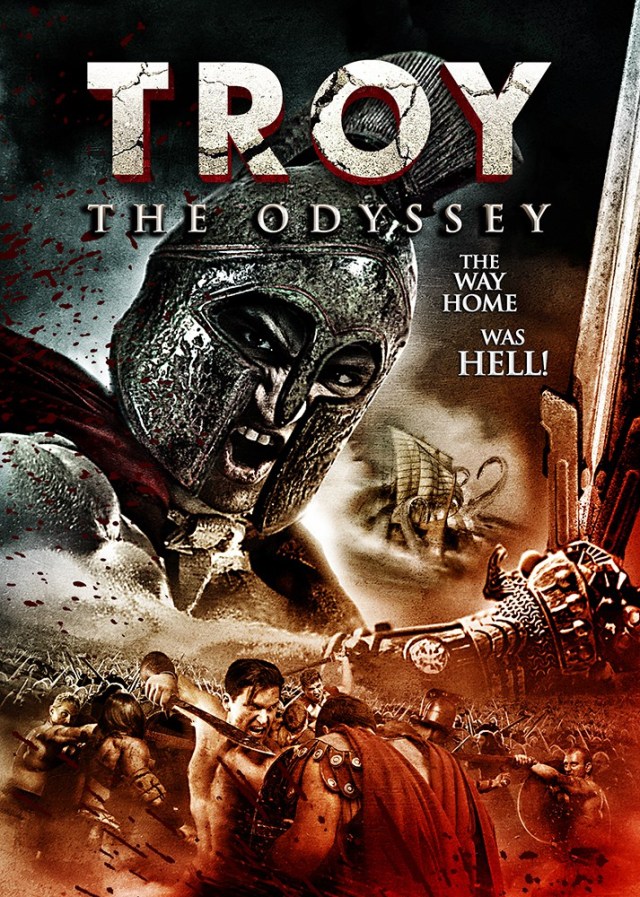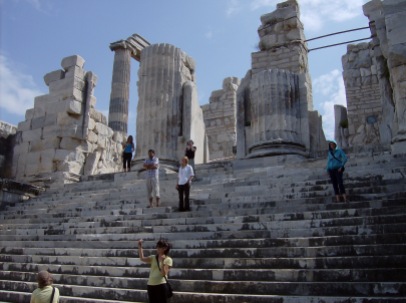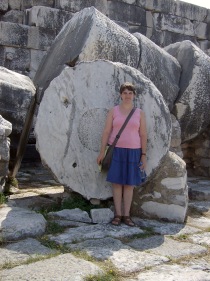
I have always been drawn to movies that tackle Classical Mythology, or try. For many in the audience there has been considerable outrage over whether or not ‘this was accurate’ or ‘that didn’t happen’ and on, and on, and on. So goes the sad critical tale.
We like our myths and our history and our ‘swords and sandals’ to be accurate, we are defensive of the things we love. Having worked hard to achieve some expertise in such things we naturally feel threatened by what seems to us as the less than professional and slip-shod representations of what we perceive as our intellectual property. What bunk – that couldn’t be farther from the truth of it.
The heroic narratives of Classical Myth are not our exclusive domain, they are for everyone to use and exploit. That’s right exploit. The culture that created these myths would recognize their capacity for adaptation, adulteration, evolution and yes – exploitation. These narratives serve as interlocutors between poet and audience, each invested in the generative process and willing to listen and speak when needed.
Now, it has been our pleasure to put ourself into this space. The critical space between cinema and audience and let me tell you it was a lot of fun. At the time of our live-tweet of Troy: The Odyssey (2017) we had stated that we did it “so that you don’t have to” but I think that after reading this I suggest that you give it a try.
In this critical space we did not concern ourselves with such things as accuracy and fidelity. No, not at all, we celebrated the chaotic mash-up that was being presented before us in the guise of familiar heroes, troupes and themes. What became immediately apparent was how easily these literary pieces, these myths worked together.
I thought as I watched, that low-budget productions could be enjoyed on a completely different level by someone who had a working knowledge of these myths, but that really and perhaps fundamentally was not required at all. The frenetic pace of the story, the locations and even the absurdity of it did not get in the way of it’s entertainment quality.
Now, was it gripping and filled with tension? Were the performances of the actors transcendent? – not in the slightest, but it didn’t matter. All the while serving to support my enjoyment were the myths themselves. They did not waver, nor crumble. They did not become diminished by my enjoyment of this Epic Cycle on a budget. They only became enriched. As a supporting lath, my knowledge of Classical Mythology, Epic and Athenian Tragic drama served to support this thin heroic plaster.
I will say there were more enough ‘scratch your head moments’. It’s title hints at part of it’s many issues – that being, it’s not sure what it is on about. It is called Troy: The Odyssey and in a rather interesting way begins in the final moments of Troy itself. We are quickly introduced to a rather motley crew of our expected heroes – then things go south straightaway. Achilles is slain by Circe, who in this narrative is a bow wielding Trojan and is quite close to Priam. Helen and Paris, only seen briefly are shuffled off as not important. Agamemnon is quite ‘interesting’. His ambition to take Troy is recognizable but the choice of actor and his ‘adapted’ dialogue really made me guffaw whenever he spoke. He was more Biker than a Basileus.
In the moments before the fall of Troy the enraged Priam decides to curse the Greeks by “unleashing the Kraken”. It was at this point both myself and my co-host looked at each other quizzically. To add to the ‘high-drama’ of it all, in order to summon the Kraken a blood sacrifice must be offered. So, looking about and sensing the end is near, Priam having drawn the Sword of Troy (?) conveniently cuts his own throat over a golden bowl. Oh, did I neglected to mention that Circe had just previously used the Sword of Troy to blast an unfortunate Greek soldier with magical lighting? Inspiring.
If that is not changing things up a bit, I’m not sure what is. Out the window is the entire “Greeks behaving badly” motif and in it’s place a tale of fatalistic revenge and wrath. Take that Odysseus! Here Poseidon does not curse you – Priam, the Kraken and all of Troy will chase you down!
We do finally see the poor CGI Kraken at the very end of the film on the beach at Ithaca. This adapted mythological beastie is handily dispatched by Odysseus and Circe working in concert. This victory leads to the final reconciliation of these figures, as Circe and Odysseus acknowledge their friendship and go about their separate ways. But let’s rewind to the part of the film that tries to be more Odyssey and less Iliad.
Things accelerate quickly at this point as we witness Odysseus` escape from Troy in a boat that is the size of a bathtub.He has mentioned that he wishes to return home but I think he’s going to have some trouble with this considering the Kraken and all. At this point I said to myself, okay so THIS is the Odyssey now. The drama flips to Ithaca, complete with a lovesick Penelope and the rapacious suitors – strangely all in armour and quite bellicose. Led by Antinous whose shouting is only strangely contrasted by the silence of the other ‘suitors’. Is this the halls of Ithaca, or another version of the court of Tyndareus? Not sure, it doesn’t matter. Here Penelope considers suicide if her beloved Odysseus does not return. We are quickly introduced to Telemachus a curly, pimply redhead who is quite committed to his mother and the ‘idea’ of this father, so again – familiar territory.
Back to the crew of the bathtub somewhere out on the sea. Odysseus and 4 companions, that now include the captured Trojan mystic Circe sail about aimlessly. They are lured to an island, though warned by Circe that this is the abode of the Sirens. Now things do get a bit weird because the Sirens, the Lotus Eaters, traditional Circe and Calypso have all been compressed into one dangerously seductive beauty who wishes to keep our intrepid hero all to herself. After drugging him and tempting him with immortality she grows weary of his desire to return to his wife and after trying to entertain him with a rather bloody gladiatorial contest, strikes out and releases him onto the island.
It’s here were the ‘budget’ of the film begins to shape the myth. I say this because now, instead of “to the sea! to Ithaca!” The remainder of the Odyssey component becomes terrestrial. Yes, Odysseus is a land-lubber. He and what is left of his crew travel overland in a series of adventures that do not really imitate anything seen in the Odyssey. There is one section that has them enter the ‘land of the dead’ – but it looks more like an abandoned Thai prison, whose dark and labyrinthine corridors even include an adapted Minotaur! I was really shocked by that one, because it was literally a guy in bear suit. You have to see that one to believe it – gripping!
They do navigate the trials and tribulations of this land bound Odyssey to finally have Odysseus partake in a quick boat trip directly to Ithaca. Here as a beggar the story moves ahead. Odysseus encounters his son and they hatch the plan of revenge. Penelope hears of the beggar and recognizes (?) her wayward husband at last. But not before the legendary test of the bow. This goes over rather anti-climatically because after Odysseus strings and fires the arrow successfully, he puts it down and begins to speak! Where’s the slaughter you may say? Where’s the justice? She left long ago – instead in this moment Antinous has had enough talking and we get a short one on one sword fight! Just what we always wanted – well not entirely. As I said earlier – fidelity is not this films strong point.
I could tell you how the rest of it unfolds but I’m going to leave that part up to you to enjoy!
Troy: An Odyssey (2017): 3 out of 12 axeheads from us here at MythTake!




























